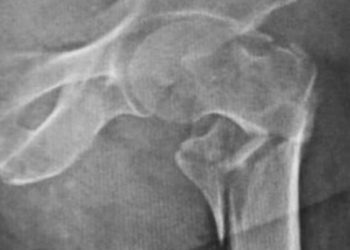30 day mortality similar between regional and general anesthesia for hip fracture surgery
1. There was no difference in 30-day mortality between regional and general anesthesia for hip fracture surgery.
2. Regional anesthesia was associated with a shorter length of stay in the hospital than general anesthesia among patients undergoing surgery for hip fractures.
Evidence Rating Level: 2 (Good)
Study Rundown: Hip fractures are an important cause of morbidity and mortality among older individuals in the United States. Surgical intervention for hip fractures can either be performed under general anesthesia or regional anesthesia. It is believed that regional anesthesia is associated with better outcomes than general anesthesia, but there is conflicting data and no prospective study has ever been done. This study examined all hip fracture surgeries from 2004-2011 in the state of New York using the Statewide Planning and Research Cooperative System (SPARCS) to determine whether 30-day mortality is different between the two types of anesthesia. Included individuals were at least 50 years old and were admitted to the hospital for open reduction, internal fixation, hemiarthroplasty, or total hip arthroplasty for a hip fracture. Of those included, 15,904 received regional anesthesia (28%) and 40,825 (72%) received general anesthesia. Thirty-day mortality was 5.3% for regional anesthesia and 5.4% for general anesthesia, with no significant difference observed. Strengths of this study include the long follow up period, completeness of data, and ability to control for important comorbidities that contribute to the decision of which anesthesia technique to use. This study was observational in nature and the data did not include potentially important information, such as the type of regional block used. The data in this study are only from New York State, which may not be generalizable to the rest of the country. While this study suggests that there is no difference in 30-day mortality based on anesthesia type, a prospective study including many states is needed to more definitively compare anesthesia techniques for hip fracture surgery.
Click to read the study, published today in JAMA
Relevant Reading: Outcome by mode of anaesthesia for hip fracture surgery. An observational audit of 65 535 patients in a national dataset
In-Depth [retrospective cohort]: This study compared 30-day mortality and length of stay between regional and generalized anesthesia among individuals over the age of 50 undergoing surgery for hip fracture in the state of New York between 2004 and 2011. Of those included, 28% (15,904) of individuals had regional anesthesia and 72% (40,825) had general anesthesia. Those receiving general anesthesia were more likely to be older, have chronic lung disease, live in areas of higher average income, be treated in small hospitals with less skilled nursing staff and that were not teaching hospitals or trauma centers. Thirty-day mortality was 5.3% for regional anesthesia and 5.4% for general anesthesia (difference -0.1, 95% CI -0.5-0.3, p=0.55). Near-far matching also showed no statistically significant difference between anesthesia techniques (instrumental variable estimate risk difference -1.1, 95% CI -2.8=0.5, p=0.18). Regional anesthesia was associated with a shorter unadjusted length of stay than general anesthesia (difference -0.2 days, 95% CI -0.3–0.2, p<0.001). Length of stay was also shorter for regional anesthesia than general anesthesia in the near-far matched model (difference -0.6 days, 95% CI -0.8–0.4, p<0.001).
More from this author: Ambulances equipped for thrombolysis allow for more rapid stroke treatment, Physical therapy for hip osteoarthritis may not lead to significant benefits, Smaller changes in kidney filtration may predict end stage renal disease progression, Bariatric weight loss surgery linked with remission in diabetics, No link between TNF-a inhibitor use and cancer in inflammatory bowel disease
Image: PD
©2012-2014 2minutemedicine.com. All rights reserved. No works may be reproduced without expressed written consent from 2minutemedicine.com. Disclaimer: We present factual information directly from peer reviewed medical journals. No post should be construed as medical advice and is not intended as such by the authors, editors, staff or by 2minutemedicine.com. PLEASE SEE A HEALTHCARE PROVIDER IN YOUR AREA IF YOU SEEK MEDICAL ADVICE OF ANY SORT.



![Radiofrequency catheter ablation effective as first-line therapy for atrial fibrillation [RAAFT-2 trial]](https://www.2minutemedicine.com/wp-content/uploads/2014/02/afib_-75x75.jpg)



